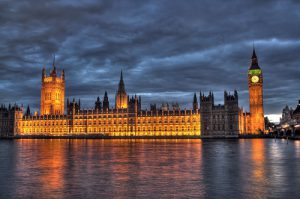 On Tuesday morning, UK Prime Minister Theresa May announced that she is proposing a snap election for Parliament on June 8. The House of Commons is likely to authorize the vote on Wednesday, leaving just 49 days until the third national election in three years. Here’s what you need to know.
On Tuesday morning, UK Prime Minister Theresa May announced that she is proposing a snap election for Parliament on June 8. The House of Commons is likely to authorize the vote on Wednesday, leaving just 49 days until the third national election in three years. Here’s what you need to know.
Why is Theresa May calling for this vote now?
May says political opposition from the Labour Party, Scottish nationalists, and “unelected members of the House of Lords” is undermining her ability to negotiate favorable terms for the UK’s departure from the European Union. Speaking outside 10 Downing Street on Tuesday morning, the prime minister said their “political game-playing … jeopardises the work we must do to prepare for Brexit at home and it weakens the government’s negotiating position in Europe.”
Postponing the election, May said, means that campaigning will not ramp up as she is concluding Brexit terms and setting the conditions of the UK’s future access to the EU’s single market.
Why does the House of Commons have to authorize the election?
The Fixed-Term Parliaments Act of 2011 states that national elections will be held only once every five years. The last national election was held in 2015, and the next one was scheduled for 2020. However, two-thirds of the House of Commons’ 650 members can vote to allow a snap election. May said she will ask for that vote on Wednesday. Opposition party leaders support the call.
What issues will be the most important in the campaign?
May will campaign on Brexit, Brexit, Brexit – saying that her opponents are endangering the fragile state of talks with Brussels. Polls show an increasing number of Remain voters wish politicians would “get on” with the business of extricating the UK from the EU in the most advantageous way. “The country is coming together, but Westminster is not,” May said. “Division in Westminster will risk our ability to make a success of Brexit, and it will cause damaging uncertainty and instability to the country.” Remain voters, meanwhile, see this as the closest opportunity they will have to hold a second national referendum on EU membership.
May’s chief opponents hope to emphasize domestic issues, such as the intensifying crisis of medical care provided by the National Health System (NHS). Labour Party leader Jeremy Corbyn promised to run a campaign “challenging the economic narrative that says there have to be huge cuts in public expenditure” and calling on taxpayers to “invest in the future, invest in infrastructure.” Scottish First Minister Nicola Sturgeon vowed to oppose the “increasingly right-wing direction” of May’s government, including opposing “the hardest possible Brexit … more austerity and deeper cuts” to the budget.
Who is likely to win?
Barring a radical upheaval in the electorate – which is always a possibility – May looks to win in a landslide. A YouGov poll performed for the Times this week shows May with an astonishing 21-points lead over Corbyn. That marks Labour’s lowest rating since Margaret Thatcher’s victory in 1983. YouGov forecasts a shift of as many as 56 seats from Labour to the Tories in June. A victory would extend May’s term as prime minister until 2022.
What does the election mean for the nation’s future?
The pound surged to its highest level in months after the announcement. (It briefly dipped this morning over fears May planned to resign.)
Long-term, it strengthens Theresa May’s hand, internally and externally.
“Some are worried that this will allow Mrs. May to push ahead with a ‘super-hard’ Brexit that inflicts unnecessary damage on the economy,” wrote Julian Jessop of the Institute of Economic Affairs (IEA). “But these fears are difficult to square with the government’s increasingly moderate rhetoric on many issues – notably migration. Instead, the Conservative leadership is likely to use the election as a chance to secure a mandate for the type of Brexit that most people appear to want. There is already plenty of evidence that the public are swinging behind Mrs. May’s more conciliatory approach.”
Politically, it will give PM May – who was never elected in a national election – a popular mandate to pursue Brexit and carry out her domestic agenda. In 2015, David Cameron won election as prime minister with a 17-seat majority. But he opposed Brexit and stepped down after Remain lost last June’s Brexit referendum, 52-48. Up to a dozen Tory backbenchers have rebelled against May’s plans on Article 50 and school reform. Former MP Paul Goodman argues that the Conservative Party’s candidate selection rules will allow May to remake the party in her own image.
However, Jessop worries that one negative byproduct of the snap election is that parties will “simply cut-and-paste commitments from previous manifestos even though the case for them is (now) weak.” Since there is little time to craft new policy proposals, parties will simply recycle outdated planks, artificially extending their intellectual lives.
Since May’s Tory Party has been governing, its members enjoy a significant advantage in formulating detailed plans for the election they are all but certain to win.
(Photo credit: Maurice. CC BY 2.0.)

